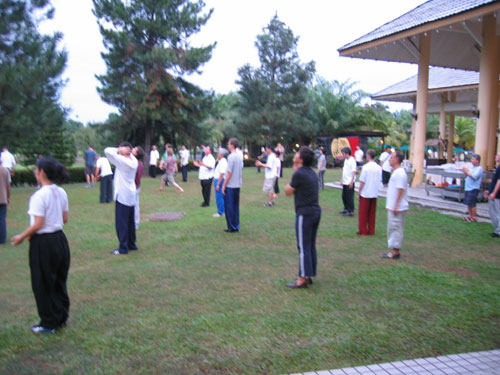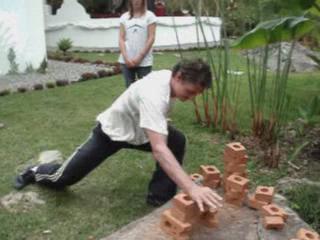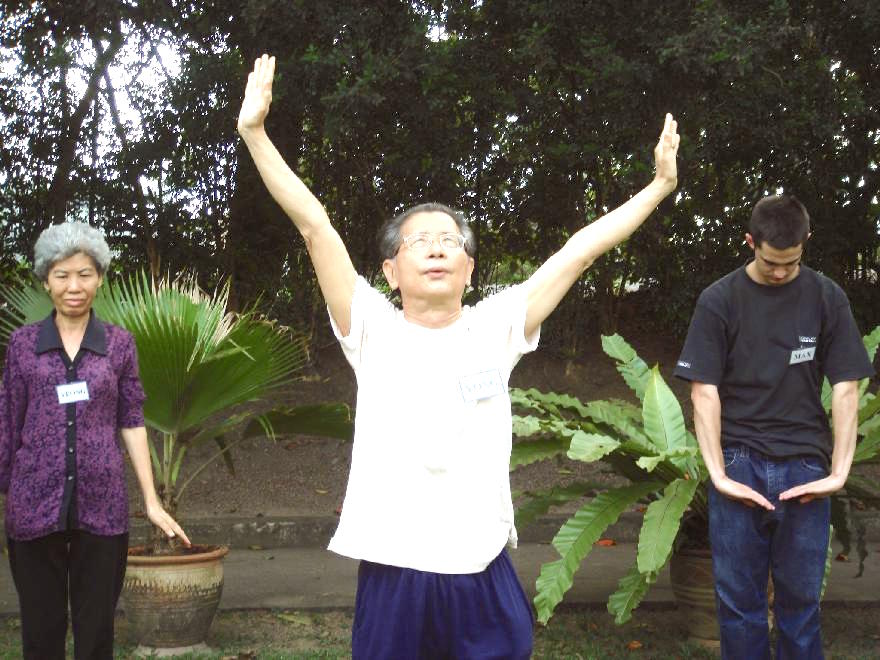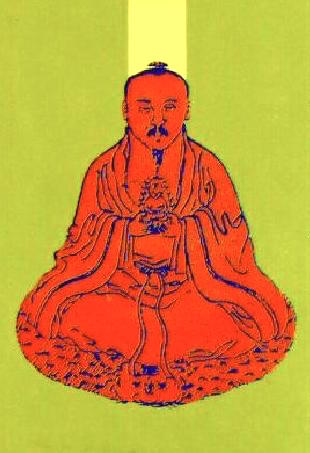May 2009 (Part 3)
SELECTION OF QUESTIONS AND ANSWERS

One should not worry or intellectualize when practicing chi kung. Just enjoy the practice as this large group of Shaolin Wahnam members are doing during a review course.
Question 1
I would like to practice qigong, but there is a question in my mind that has been preventing me from doing it so far. From my meditative practices in the past I know that the mind can create any illusion with ease and quickness, be it a change in emotions, a vision, strong sensations, etc.
— Tatnana, Russia
Answer
You have become a victim of intellectualization. The reason which you think prevents you from practicing and benefiting from chi kung is not valid. It is self-made and self-limiting. Your first step is to clear away this mental blockage, not just for the sake of practicing chi kung but to free yourself from your self-made mental imprisonment.
Your meditation practice has resulted in a perverted view which you need to erase for your own benefit. It is true that the mind can create illusions, but this is harmful only if your mind is weak or if you are unethical. If your mind is week, you may mistake the illusions for reality.
In fact, many people are victims of this weakness, often without realizing it. If their children are late from school, for example, they may conjure illusions that some accidents might have happened to them. If their colleagues at work gather together, they may conjure illusions that their colleagues are talking bad about them behind their back.
On the other hand, if a meditator has a strong mind but lacks ethics, he many conjure illusions to confuse people. Politicians often do this. They conjure illusions that appear to benefit the public but actually benefit the politicians' own interest.
Question 2
For the practice of qigong it is required to focus on learning to feel qi instead of just practicing external movements.
Answer
This is your mistaken conception, which is the result of your mistaken intellectualisation. In the practice of qigong, it is not necessary to focus on learning to feel qi. You should also not just practice external movements.
Then, what should you do? Very simple — just do it, i.e. practice qigong. How do you do so? Learn from a good teacher.
It will be easier for you to comprehend if we use an analogy. Suppose you want to swim or to play football. What should you do?
Very simple — just do it, i.e. go swimming or play football. How do you do so if you can't swim or play football yet? Learn from a good swimming or football teacher. You don't swim or play football by intellectualizing that you should be able to drink a lot of sea water or survive a few fractures before you can swim or play football.

Steve from Shaolin Wahnam Australia breaking the bottom of two bricks on the Blue Mountain. You can view his demonstration here.
Question 3
But how is it possible to know if what you focus on and feel is real qi and not another illusion?
Answer
In principle it is the same as saying how is it possible for you to know your nose on your face is real and not just an illusion.
Anyway I shall answer your question. It is possible to know that qi is real, or your nose is real, from direct experience. Of course, if you never had any direct experience of your nose, you would have difficulty telling the difference between reality and illusion.
In the same way, if you never had any experience of qi, you would have difficulty telling the difference too. Indeed, this is the case with many qigong practitioners today. Those who had no experience of qi, would not know whether qi was real or an illusion. They would still ask what qi is. Some may vehemently argue that qi is an illusion. But those who have experienced qi, knows that it is real, as surely as they know the nose on their face is real.
Question 4
I understand that it may be judged by long term effects of qigong practice, but I am afraid that during the time that is required to evaluate the effects more or less realistically, I'll be creating a sustained illusion that might become hard to get rid of later.
Answer
You are creating unnecessary problems for yourself. Qigong practice can be judged by long term effects like good health and vitality, as well as by short term effects like tinkling feeling at the fingers and sensation of warmth over the body.
Students at my intensive chi kung courses experience such short term effects on the very first day of the course, and the long term effects a few months later. They do not have to evaluate whether these effects are true because they know they are from direct experience. Besides, getting rid of illusion is irrelevant because they do not have to create any illusion in the first place.
In other words, after a qigong session on the first day of my intensive courses, some students feel tingling sensations on their finger tips while others feel warmth over their body. They do not need any intellectualization or scientific instruments to evaluate whether the tingling or warmth sensations are real because they distinctly experience these sensations, and they trust their own experience.
The question as whether these sensations are an illusion does not arise because they know very well they did not attempt to create any illusion. They also do not bother to question whether the illusions still arise despite their not consciously creating them. They simply enjoy the sensations, which are pleasant and which indicate the reality of qi.
After a few months, some find out from direct experience that they no longer suffer from the illness they suffered before, while others find out that they have more energy to carry on their day. They do not intellectualize or use scientific instruments to evaluate whether their new found health and vitality are real or merely illusions. They simply enjoy their new life.
Some consult their doctors, not to test whether their feeling of well-being is real, but as a follow-up of their previous medical treatment, and are glad to be confirmed that they are no longer sick. They usually attribute these long term effects to their qigong practice, and not wasting time questioning whether their recovery is due to other factors.
Question 5
Is there something that could help to ensure that the practitioner is focusing on qi instead of creating a realistically-felt sustained illusion?
Answer
Firstly, I shall answer your question. Yes, it is simple. Just do it. In other words, the practitioner focuses on qi, and not creates a realistically-felt sustained illusion.
You will have a clearer picture if we ask a similar question as follows. Is there something that could help you to ensure that you really eat your food instead of creating an illusion that you are eating your food? Of course, it is simple. Just eat your food. Don't create an illusion that you are eating your food, even you have the mental power to do so.
In the case of eating food, there will be no problem at all that you can do it as you have been doing it for years. There is also no problem at all that you know your eating food is real, and not an illusion, because you can easily confirm it from your direct experience. You will also not need any intellectualization or scientific instrument to evaluate your eating food to ensure it is real.
But it is not so in the case of practicing qigong. Do you know why? The reason is that whereas you have direct expereince in eating food and therefore can readily confirm its reality, you do not have any experience in practicing qigong (genuine qigong and not merely gentle physical exercise) and therefore cannot confirm its reality. Hence, you have to depend on intellectualization or speculation, which, unfortunately, is based on your mis-information.
Now let us reverse the situation. Suppose, for the sake of this explanation, you had never eaten any food before, suppose you lived through direct exchange of qi or energy with the Cosmos by practising high-level qigong. You would then have no doubt at all that qi is real and not an illusion. But you might wonder if you ever tried eating food, whether the food was real or an illusion.
Notwithstanding this, when you practice qigong, you just practice qigong. There is no need to focus on qi during your practice. When you have generated a qi flow, you will recognize it, even when you did not try to focus on it in the first place. In the same way, when you eat an orange, you will experience the taste of an orange, even when you did not try to focus on its taste in the first place.
If you do not experience the taste of an orange, it means that actually you are not eating a genuine orange (though you may think you are), or you eat a genuine orange wrongly, like shoving the orange right into your throat without chewing and tasting it. Similarly, if you do not experience qi, it means that actually you are not practicing genuine qigong (though you may think you are), or you practice some genuine qigong exercise wrongly, like performing it as physical exercise.

"Lifting the Sky" is an excellent chi kung exercise for male and female, young and old
Question 6
My elder daughter who was in Germany was suffering from breathing problems. Due to extreme snow & winter, fluid formed in her lungs which has been removed. Now she is in India. Doctors suggested for her to go in for breathing exercises. Can you suggest some types of exercises? My doubt is in the exhalation and inhalation. How are we supposed to do? Exhale through the nose or mouth, and inhale through the nose or mouth?
— Indrajith, India
Answer
An excellent exercise for your daughter is “Lifting the Sky”. You can read about how to do this exercise from any one of my chi kung books, where it is described in details.
The breathing should be gentle. Breathe in through the nose and out through the mouth. The mouth, therefore, should be gently open when breathing out. The most important thing in the exercise is not the physical movement, not even the breathing, but the chi flow, which she should enjoy after performing “Lifting the Sky” about 20 to 30 repetitions. She should enjoy the chi flow for about 5 to 10 minutes.
This exercise has helped countless people overcome many health problems, including chest and breathing disorders.
Question 7
Sifu, for the last week, my chi kung practice has consisted of a few repetitions of “Lifting the Sky” to start the chi flowing, followed by a gradually increasing number of repetitions of “Pushing Mountain“, which now number 52 or so.
In the chi flow following the patterns, there was some movement initially. Then, everything slowed gradually and came to a stop. My body felt hollow as well as feeling as though it were made of something light. I then felt as my body were inside of my body; as if there were a much tinier body in the very core of my body.
My attention and feeling were taken to that body. Within the tiny body, I could feel a seed in its core as well. I then felt an opening from the core out to the sides of my larger, hollow body.
Then I felt a flow or wash of energy descending from my forehead, down the front of my body to the area between the genitals and the anus. The energy seemed to have a muted, golden colour. That sensation lasted for some time. What followed it was a feeling of expansion — not of the tiny body in the core, but of the larger hollow body, of my physical body.
Throughout this, there was no conscious thought that I can recall. Eventually, these sensations passed and I had the feeling that my flow had come to its natural conclusion.
In my standing meditation, I thanked the Universe for the experience and for all that it has given me. My standing meditation was markedly quieter than it normally is.
I try to avoid evaluating or judging my chi kung experiences, and I am particularly cautious in not making assumptions about what I've experienced.
— Brian, Canada
Answer
Congratulations for you wonderful experience. Your experience is like what Taoist masters describe about their spiritual cultivation at a high level.
The small body is called the “divine foetus”, which is a replica of your normal physical body. Taoist cultivators embed their “shen” or spirit into this divine foetus, and after a few years of cultivation when the foetus has grown to become an “adult”, the cultivators transfer their own shen into the “divine adult” and emerge from their “bai-hui” point at the crown of their head to become immortals.
I must emphasize that I do not have personal experience in this type of cultivation. The information is derived from some Taoist classics. I also did not ask my sifu, Sifu Ho Fatt Nam, about this type of Taoist cultivation although my sifu was also a great Taoist master. When I trained under him, my cultivation was mainly Zen.
My advice is that you carry on as you have been doing. I do not advice that you purposely embed your shen into the “divine foetus”. If the “divine foetus” develops, fine; if not, fine too.

In high-level Taoist meditation the cultivator emerges from the crown of his head as an immortal
Question 8
I saw a video on YouTube showing someone breaking a brick underneath another brick (2 bricks) and breaking a stick on eggs without breaking it.
May I ask how much it would cost to learn and how long it would take to achieve this level?
— Kew, Malaysia
Answer
We do not teach specific skills like breaking a bottom brick or a sugar cane supported on two eggs. Our students attain these skills as a result of following our regular Shaolin Kungfu or Wahnam Taijiquan training.
In other words, we do not specifically train to break a brick or sugar cane, but after some time of regular training we are able to do so. Indeed, many of our students who break a brick when testing their internal force, never tried breaking bricks before or attempted any hard conditioning like hitting a sandbag.
Nevertheless, while we are happy to be able to do so, we do not consider breaking a brick important. What we cherish more from our training is attaining good health, vitality, longevity, mental freshness and spiritual joy. Due to our training, we feel that every day is a wonderful day.
If you are interested and have prior martial art training, you may apply to attend our Intensive Shaolin Kungfu Course. Please note that application does not necessarily mean acceptance, and that following the Ten Shaolin Laws is the most important requirement.
LINKS
Selected Reading
- Satori and Solitude in Silent Standing
- Discrovery during Dinnertime Dialogue
- Secrets in Free Sparring Methodology
- The Warrior Project on the Blue Mountain
- 50 Sequences of Eagle Claw
